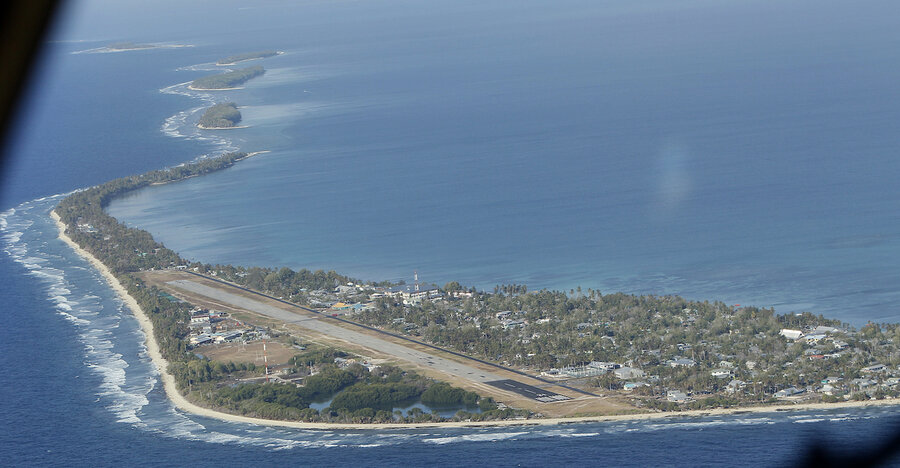A tiny island-nation’s election has big stakes for China, Taiwan
Loading...
| Sydney
It’s a tiny Pacific island nation, one of the world’s smallest. But on Jan. 26, elections in Tuvalu will be watched from Beijing and Taipei to Canberra, as voters choose a 16-seat parliament and, after negotiations, a prime minister.
A big part of the international attention is linked to the increasing importance of China in the region, and Tuvalu’s diplomatic ties to the government of Taiwan. A proposed security treaty with Australia could also hang in the balance.
Here’s what’s at stake:
Where is Tuvalu and how many people live there?
Tuvalu consists of nine coral atolls in the South Pacific Ocean. It’s about halfway between Hawaii and Australia.
Tuvalu’s low-lying atolls make it particularly vulnerable to global warming, and there are worries that rising sea levels and strengthening storms will make it uninhabitable. Prime Minister Kausea Natano is trying to raise the islands 4 to 5 meters (13 to 16 feet) above sea level through land reclamation.
It has a population of about 11,500, making it one of the smallest nations in the world.
A former British colony, it gained independence in 1978. The British monarch is still the country’s head of state.
What happens in a Tuvalu election?
All candidates in Tuvalu run as independents, with the top two vote-getters in each of the eight island electorates going to parliament.
Polls open at 8:30am (2030 GMT) on Jan. 26 and close at 4 p.m. (0400 GMT) on Jan. 26, The Guardian newspaper reported.
When the votes are in, the new parliamentarians split into groups, with the biggest electing the prime minister and forming a new government.
Who are the main candidates for prime minister?
The current prime minister, Kausea Natano, is running for parliament again, but he would have to go through the selection process again even if he wins his parliament race.
Finance Minister Seve Paeniu is also interested in the job after winning his parliament seat by running unopposed. Another potential new leader is the opposition leader, and former prime minister, Enele Sopoaga.
Why the election matters
Only 12 countries, including Tuvalu, have official diplomatic relations with Taiwan, the self-governing democratic island that China claims as its own territory. Nauru, also in the Pacific, recently switched its support from Taiwan to China.
This puts Tuvalu at the center of intense jockeying between Taipei and Beijing.
Prime Minister Natano favors strong ties with Taiwan, and is likely to continue that support. Mr. Sopoaga also favors close ties with Taiwan. Mr. Paeniu has said he wants to review Tuvalu’s ties with both Beijing and Taipei, according to The Guardian.
Mr. Sopoaga has also said he doesn’t support a new treaty between Tuvalu and Australia signed in November. That treaty, which commits Australia to assist Tuvalu in response to major natural disasters, health pandemics, and military aggression, has yet to be ratified amid an intense debate. The treaty gives Australia veto power over any security or defense-related agreement Tuvalu wants to make with any other country, including China.
This story was reported by The Associated Press.







